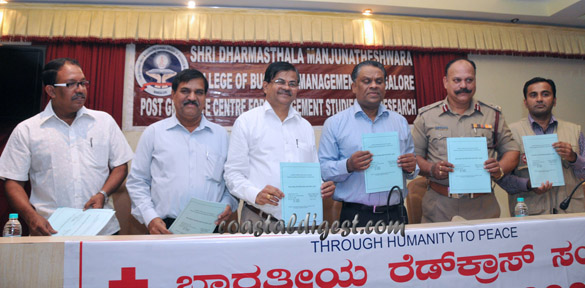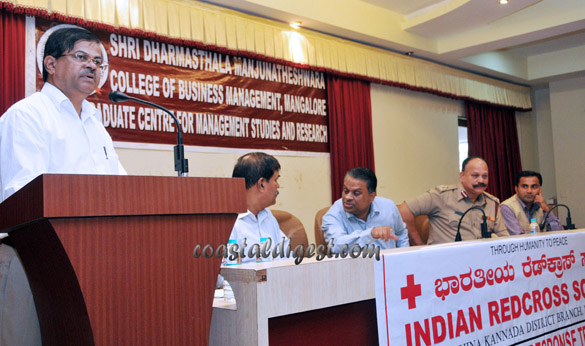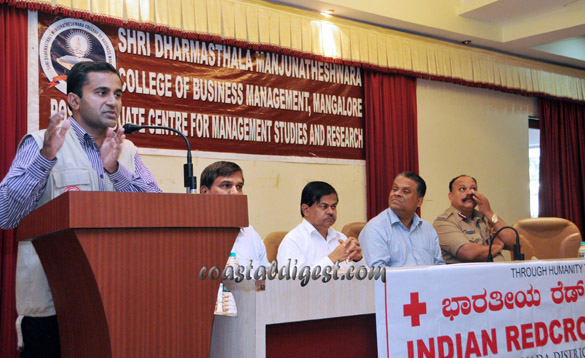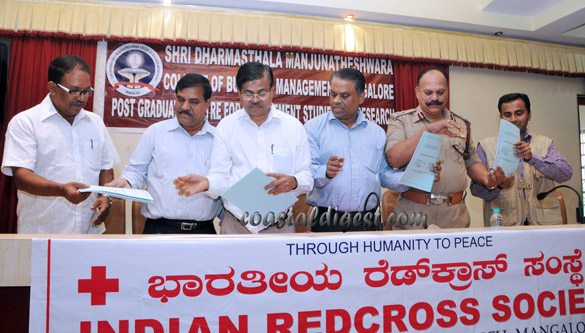
Mangalore, August 4: Terming the Coastal Karnataka as disaster-prone region, Dr. Kumar V.L.S of National Disaster Response Team, said that the possibilities of reoccurrence calamities like the devastating tsunami of 2004 could not be ruled out in this region.
Delivering the keynote address at the inaugural session of the two-day workshop on 'District Disaster Response Team Training' organised by the Dakshina Kannada district branch of Indian Red Cross Society (IRCS) on Saturday at the auditorium of S.D.M. Business Management College, Mangalore, he advised the volunteers assembled for the workshop to be in touch with the district administration during emergencies.
Stating that the disaster management was a continuous process of containment of risks, he said as many as 12 industries have been recognised in Dakshina Kannada district as Major Accidental Hazard (MAH) units, which is highest in the State after highly industrialised Bangalore. In case of any unfortunate incidents in these units, the damage would be severe. The Konkan Railway is a landslide-prone area, where disasters could occur. Hazardous chemicals are transported via two major National Highways in the region, where accidents can happen. Such reasons make Dakshina Kannada susceptible to disasters, pointed out.
He said that workshops were conducted in every district by Red Cross and humanitarian services were also rendered. Standard Operating Procedures (SOPs) are taught to the voluntary teams so that their services and official rescue operations do not overlap with each other. Training on how to provide relief and rescue operations are also taught to volunteers, to make sure that they are available to help the authorities in case of disasters, he said.
Delivering the inaugural address, Principal of SDM Business Management College Dr. Devaraj K. said that it would be much easier to tackle emergencies if a permanent disaster management team was set up in the region. “Citizens in Western countries like the US are given disaster management training, and we need to conduct workshops for the people so that loss of lives can be prevented. We must be prepared for emergencies and disasters,” he said.
He recounted last year's Fukushima's nuclear plant disaster in Japan, where the situation was brought under control within 15 days because of the effective disaster management planning of Japanese. “When the Bhopal gas tragedy occurred, the factory workers were not largely affected as they knew how to divert the leaked gas elsewhere,” he added.
Karnataka State Fire and Emergency Services Chief Fire Officer H.S. Varadaraj said that participation and response from volunteers was required during emergencies. “What is necessary during emergency situations is help and assistance, so as to recover as many casualties as possible. We need co-operation from the people if we are to perform our duty in an effective manner,” he said.
On the occasion, Dr. Devaraj released a handbook on 'District Disaster Response Team'.
Vice-President of the district unit of Indian Red Cross Society Dr. Devadas Rai presided over the programme. Chairman of Disaster Response Sub-Committee Yathish Baikampady welcomed the gathering, and Secretary of IRCS, Dakshina Kannada, Suresh Kumar proposed a vote of thanks.









Comments
Add new comment